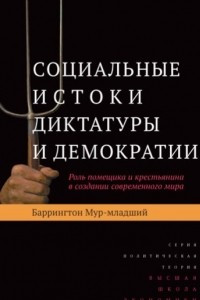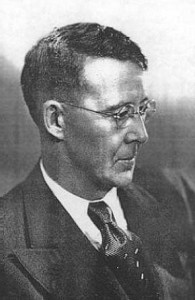-
Жанры
-
Художественная литература
- Приключения 72559
- Фантастика 95788
- Фэнтези 69837
- Детектив 57924
- Ужасы 45675
- Роман 67584
- Классическая литература 59591
- Историческая проза 8072
- Современная проза 137998
- Детская литература
- Культура и искусство
- Научная литература
- История
- Бизнес
- Прикладная литература
- Документальная литература
- Образование
- Дом и семья
- Физическая культура
- Здоровье
- Литература на иностранных языках
-
Художественная литература
- Книги
- Рецензии
- Сообщество
- Блоги
- Цитаты
- Тесты
- Подборки
- Премии
- Конкурсы
- Другое

Баррингтон Мур-младший
Краткая биография автора
Barrington Moore Jr. (12 May 1913 - 16 October 2005)[1] was an American political sociologist. He is famous for his Social Origins of Dictatorship and Democracy: Lord and Peasant in the Making of the Modern World (1966), a comparative study of modernization in Britain, France, the United States, China, Japan and India, and a philosophical history of totalitarianism. His many other works include Reflections on the Causes of Human Misery (1972) and an analysis of rebellion, Injustice: the Social B...
Barrington Moore Jr. (12 May 1913 - 16 October 2005)[1] was an American political sociologist. He is famous for his Social Origins of Dictatorship and Democracy: Lord and Peasant in the Making of the Modern World (1966), a comparative study of modernization in Britain, France, the United States, China, Japan and India, and a philosophical history of totalitarianism. His many other works include Reflections on the Causes of Human Misery (1972) and an analysis of rebellion, Injustice: the Social Basis of Obedience and Revolt (1978).
Education and private life
He graduated from Williams College, Massachusetts, where he got a thorough education in Latin and Greek and in history. He also became interested in political science, and was elected to Phi Beta Kappa. In 1941, Moore obtained his Ph.D. in sociology from Yale University. He worked as a policy analyst for the government, in the OSS and at the Department of Justice. He met Herbert Marcuse, a lifelong friend, and also his future wife, Elizabeth Ito, at the OSS. His wife died in 1992. They had no children.
Academic career
His academic career began in 1945 at the University of Chicago, in 1948 he went to Harvard University, joining the Russian Research Center in 1951. He was emerited in 1979. Moore published his first book, Soviet Politics in 1950 and Terror and Progress, USSR in 1954. In 1958 his book of six essays on methodology and theory, Political Power and Social Theory, attacked the methodological outlook of 1950s social science. His students at Harvard included comparative social scientists Theda Skocpol, and Charles Tilly.
Views
Social origins of dictatorship and democracy
Moore's groundbreaking work Social Origins of Dictatorship and Democracy (1966), was the cornerstone to what is now called comparative historical analysis in the social sciences. In that work he studied the conditions for the sociogenesis of democratic, fascist and communist regimes, looking especially at the ways in which industrialization and the pre-existing agrarian regimes interacted to produce those different political outcomes. He drew particular attention to the violence which preceded the development of democratic institutions.
Moore lists five conditions for the development of Western-style democracy (through a "bourgeois revolution")[2]:
the "development of a balance to avoid too strong a crown or too independent a landed aristocracy"
a shift toward "an appropriate form of commercial agriculture"
a "weakening of the landed aristocracy"
the "prevention of an aristocratic-bourgeois coalition against the peasants and workers" [which would lead to fascism]
a "revolutionary break with the past".
Moore's concern was the transformation of pre-industrial agrarian social relations into "modern" ones. He highlighted what he called "three routes to the modern world" - the liberal democratic, the fascist, and the communist - each deriving from the timing of industrialization and the social structure at the time of transition.
In the simplest sense, Social Origins can be summarized with his famous statement "No bourgeoisie, no democracy"[3] though taking that idea at face value undercuts and misinterprets the nuances of his argument.
In England, the effect of the "bourgeois impulse" was to change the attitudes of a portion of the landed elite towards commercial farming, leading to the destruction of the peasantry through the enclosure system and the English Civil War which led to an aristocratic, but moderate democracy.
In France, the French Revolution did directly include the bourgeoisie, but it was the overwhelming influence of the peasantry that determined "just how far the revolution could go." The peasantry remained thereafter a reservoir of reactionary attitudes.
In the United States, the industrial north's victory over the Southern planter elite in the Civil War cemented the U.S. path to modernity through liberal democracy, but only after southern planters "acquired a tincture" of urban business - essentially changing their attitudes towards capitalist accumulation. The result, however, was that once this transformation took place, the Northern capitalists ended Reconstruction and allowed the South to implement Jim Crow.
Moore also directly addressed the Japanese transition to modernity through fascism and the communist path in China, while implicitly remarking on Germany and Russia.
For Moore, the influence of the bourgeoisie in Japan was significantly more limited than in England, France, and the U.S. Instead of the capitalist accumulation through the "bourgeois impulse" as it did in those three cases, Japan's late transition to industrial modernity was induced through "labor repressive" agriculture - squeezing the peasantry to generate the necessary capital for modernization. This "revolution from above" served to cement a reactionary alliance of a weak bourgeoisie and powerful landowners that culminated in fascism.
In China, the overwhelming strength of the peasantry vis-a-vis the bourgeoisie and the landed elites resulted in the Chinese Revolution, but ironically they were its first victims. Here, the bourgeoisie allied with the peasants, and created a "revolution from below."
One can see Moore's theme of the bourgeoisie again here - in the states that became democratic, there was a strong bourgeoisie. In Japan and China, the bourgeoisie was weak, and allied with the elites or peasants to create fascism or communism, respectively.
The wide range of critical response to Social Origins was examined by Jon Wiener in the journal History and Theory. [4]
In 1965, Moore, Herbert Marcuse, and Robert Paul Wolff each authored an essay on the concept of tolerance and the three essays were collected in the book A Critique of Pure Tolerance. The title was a play on the title of Immanuel Kant's book Critique of Pure Reason. In the book Moore argues that academic research and society in general should adopt a strictly scientific and secular outlook and approach theories and conjectures with empirical verification.[5] The essay "Repressive Tolerance" is one part of this book.
На нашем книжном сайте Вы можете скачать книги автора Баррингтона Мура-младшего в самых разных форматах (epub, fb2, pdf, txt и многие другие). А так же читать книги онлайн и бесплатно на любом устройстве – iPad, iPhone, планшете под управлением Android, на любой специализированной читалке. Электронная библиотека КнигоГид предлагает литературу Баррингтона Мура-младшего в жанрах .
Творчество Баррингтона Мура-младшего
На нашем сайте представлена 1 книга автора Баррингтона Мура-младшего. Самая популярная по мнению наших читателей "".
В классической работе выдающегося американского исторического социолога Баррингтона Мура-младшего (1913–2005) предлагается объяснение того, почему Британия, США и Франция стали богатыми и свободными странами, а Германия, Россия и Япония, несмотря на все модернизационные усилия, пришли к тоталитарным диктатурам правого или левого толка. Проведенный автором сравнительно-исторический анализ трех путе...
Похожие авторы

Если у Вас возникли вопросы по работе сайта - напишите нам!
нашли ошибку на странице!

Нейросеть ориентируется на оценки прочитанных вами книг
поиск

Найдите книгу, автора, подборку, издательство, жанр, настроение или друга на Книгогид
подборки

Создавайте подборки с книгами, которые вы прочитали, подписывайтесь на подборки интересных пользователей.
Регистрируясь, вы соглашаетесь с нашими Условиями и политикой конфиденциальности
Книгогид использует cookie-файлы для того, чтобы сделать вашу работу с сайтом ещё более комфортной. Если Вы продолжаете пользоваться нашим сайтом, вы соглашаетесь на применение файлов cookie.









